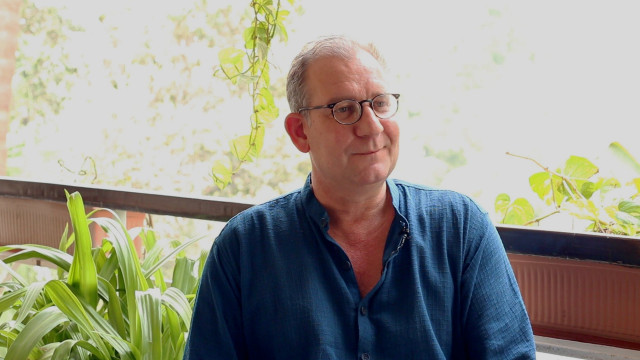German film-maker Till Passow has a solution to Pakistani cinema's woes
Visiting Pakistan every year for the last two decades, Passo has seen the film scene in the country evolve

German film-maker Till Passow has a solution to Pakistani cinema's woes
“The major thing missing in Pakistan are serious film festivals,” said German filmmaker Till Passow as he sat down for an interview with The Express Tribune recently. Passow is an award-winning film-maker who has made a documentary on the Sufis of Sindh. He was recently in Karachi to conduct a workshop with aspiring film-makers.
Visiting Pakistan for the better part of two decades almost every year, Passo has seen the film scene in the country evolve, from its lowest ebb in the mid-2000s to its current high. “There were some film festivals in the past but there is nothing like that right now,” Passow said, referring to the Kara Film Festival which ran for a few years before it came to a halt.
This, he said has created a big void for the local film-makers. “You have the Goethe Institut that screens films every Sunday. It is great that this [facility] is there, but this cannot, of course, replace a film festival,” he lamented.
Passow said that one thing that has changed during this time is the number of media and film production programmes being offered at universities than when he first came to Pakistan. “But I still think film education is a big problem,” the German said. “You [film students] are not taught how to pitch films, you are not taught how to sell ideas, and that is the main thing as you need money to make your films,” he explained.
“In Pakistan, you do not have the possibility that you get money from the government,” he said, pointing out that only the media branch of the military has so far invested in films. “So this option [of securing money from governments] is not there, hence you need to get money from abroad to make films, or you need to find sponsors which are also difficult, especially if you are talking about art films and not the mainstream films.”
Passow is trying to help budding film-makers of the country by teaching them how to secure funds for making films along with other film-making and storytelling techniques such as developing core ideas into compelling movies.
Sufi journey
Pakistan is no stranger to foreign film-makers coming and recording here with major western productions such as scenes from Rambo III and later Vertical Limit being shot here. But Passow’s journey was quite unlike those of other film-makers for he did not arrive here chasing a story, rather it was a song that lured him.
“It all started in India, actually, where I was an exchange student at the Film and Television Institute in Calcutta {nee Kolkatta),” he said. There, he made his award-winning documentary short Hawra Hawra, about the Hawra railway station in the city.
While at the film school, Passow recalled that most of the students liked to ‘party’, so much that they did it every night and at some point during each party, Nusrat Fateh Ali Khan and his Sufi songs would be played. “I saw Nusrat in Frankfurt in the late 1980s and that was a mind-blowing experience for me,” Passow said, adding that the Indian students also had a lot of respect for the maestro.
“I thought I should research more on that,” he said and he started to look closely at Sufi traditions. Nusrat’s rendition of Mast Qalandar led him to the shrine of Lal Shahbaz Qalandar. And soon after, Passow found himself shooting a short documentary on the Sufi shrines titled Mast Qalandar.
“I also went to Bhit Shah for the [annual] mela. I realised Sehwan would be a wonderful place to make a film on Sufi culture in Pakistan. That’s how I made Mast Qalandar. “I was very impressed by the passion of the devotees and very touched. I felt deep spirituality there and I wanted to learn more about it,” he said.
Have something to add to the story? Share it in the comments below



















COMMENTS
Comments are moderated and generally will be posted if they are on-topic and not abusive.
For more information, please see our Comments FAQ